- Home
- Linwood Barclay
Never Saw It Coming Page 11
Never Saw It Coming Read online
Page 11
The distance between the two cars closed. Keisha could see two officers in the vehicle. A woman behind the wheel, a man riding shotgun.
Just look ahead, she told herself. Like you don’t care. Be cool.
The cars met.
As the police car slid past, Keisha was certain no one looked over. She kept her eyes front. Seconds later, she glanced in her rear-view mirror, expecting the patrol car’s brake lights to come on, for the car to turn around, to come after her.
Lights flashing.
But nothing happened. The police car continued up the street, even going past the Garfield house.
Keisha put on her blinker, turned left at the corner.
Home free.
Eighteen
Rona Wedmore told dispatch she needed a couple of uniformed officers to accompany her to the Garfield house. One of their cars, she was informed, had just passed by that location. They’d return to the address and wait for Detective Wedmore’s arrival.
It was possible Wendell Garfield would do as she asked, and come down to the station without protest, but you never knew, so it was good to have backup. While Garfield wasn’t going to be charged with murder, he was still in a peck of trouble. He’d covered up for his daughter, he’d moved his wife’s body and disposed of it, he’d misled investigators. Wedmore was even betting there was some kind of environmental pollution charge for dumping a vehicle in a lake, although that would seem to be the least of Wendell’s problems.
Wedmore recognized the two police officers waiting for her. Lisa Gibson and Brett McBean. Lisa had been on the force for about a decade, Wedmore was thinking, and McBean maybe half that time. Both good cops, so far as she knew, although there was talk that since they’d been partnered six months ago, something was going on between them. Not a good thing.
Lisa got out from behind the wheel and McBean followed suit as Wedmore pulled up. Lisa was about five foot eight, but McBean was a towering six foot five and looked like he’d have been more at home in a basketball jersey than a police uniform.
“Hey, Lisa, Brett,” she said.
“Did they find his wife, Detective?” Lisa asked.
Wedmore said, “We have an idea where to look. The daughter’s just confessed to killing Mrs. Garfield, and Mr. Garfield helped cover it up. I’m bringing him in. Have you noticed anything since you’ve been out here?”
They both shook their heads. “He hasn’t come out,” Brett said. “Officer Gibson just said she hasn’t even noticed a curtain move since we got here.”
Officer Gibson, Wedmore thought. That was all the proof she needed that these two were an item.
“Let’s just play this as a straight visit,” Wedmore said. “Garfield doesn’t know his daughter came into the station and made a confession. So far as he knows, we’re here with an update.”
The two cops nodded, and followed Detective Wedmore to the door. She rang the bell while Gibson and McBean stood symbolically behind her.
There was no answer.
Wedmore rang the bell a second time, glancing over her shoulder to take note that Garfield’s Buick was in the drive. When still no one answered, Officer Gibson said, “Maybe he’s in the shower.”
McBean said, “Check it out.”
Gibson and Wedmore looked at him, saw that he was staring straight down, and followed his gaze. There were several dark drops of something on the flagstones.
“From way up here, that looks like blood,” McBean said.
As Wedmore knelt down, she reached into her pocket for a latex glove, snapped it onto her right hand, and touched the tip of her index finger to one of the drops. She gave it the briefest of inspections, looked up and said to McBean, “You go around the back of the house. Lisa, you stay with me.”
McBean gave his partner a look, and went.
Wedmore stood, pulled a tissue from her pocket and wiped off the end of her index finger, but kept the glove on. She wadded the tissue, tucked it back into her pocket, then pulled back her jacket to reveal the holstered gun attached to her belt. She took it out, held it pointed down at her side, and tried the doorbell one more time.
She waited ten seconds, then reached for the knob and turned it slowly to see whether the door was locked.
It was not.
She pushed it wide and called out, “Mr. Garfield! Mr. Garfield, are you home? It’s Detective Wedmore!”
Wedmore only needed to take one step into the foyer to see what was awaiting her in the living room.
“Jesus,” she said.
Her eyes fixed on Wendell Garfield’s body, the pool of blood around his head, some kind of long blue stick coming straight out of his eye socket.
“Oh God,” said Officer Gibson, who had stepped in behind the detective.
Wedmore’s hand was up in a “don’t move” gesture.
“Ask McBean what’s happening around back.”
Gibson touched the radio clipped by her shoulder. “Anything going on out there?”
There was a crackle of static. McBean said, “Nothin’.”
“Get him back here,” Wedmore said.
Gibson told him they needed him around front. Seconds later, he was in the foyer, and saw what the other two were looking at.
“Fucking hell,” he said.
“Secure the house,” Wedmore told them.
The two of them went through the place room by room, closet by closet, and returned to the foyer a minute later to find Wedmore standing over the body, just far enough back that her shoes were not touching blood.
“House is empty,” Officer Gibson said. “’Cept for him.”
“What’s that sticking out of his eye?” Officer McBean asked.
“Looks like a needle, for knitting,” Wedmore said. It wasn’t a pastime she’d ever pursued, but her late mother used to spend hours doing it. Then she saw a ball of yarn on the floor. “There ya go.”
“I think I’m going to be sick,” McBean said and excused himself.
Officer Gibson grimaced as her partner fled and said to Wedmore, “He’s not good with a lot of blood.”
“Call this in. Get everyone out here,” Wedmore said. “This scene is fresh.”
Gibson went outside to make the calls.
Wedmore did a slow circle around the room, studying everything, looking for anything. She went into the kitchen and saw the pot of tea that was still warm to the touch, and the single mug that had been waiting to be filled.
“This was looking pretty simple up until about five minutes ago,” Wedmore said to herself. The Ellie Garfield case had appeared to be a totally domestic affair. Daughter kills mother, father covers it up. Everyone—victim, perpetrator, accomplice after the fact—related. A family tragedy from beginning to end.
But this, well, this had the potential to change everything. Garfield’s death broadened the circle. Melissa couldn’t have done this, because she’d been in police custody the last couple of hours. Wedmore didn’t need a forensic examiner to tell her this murder was less than two hours old. And Garfield—or at least someone claiming to be him—had phoned the station little more than an hour ago, asking for a progress report in the search for his wife.
A shrewd move, Wedmore thought. A nice way to deflect suspicion. Not that his cleverness made much difference now.
She came back to the living room, stood once again over Garfield’s body. A woman’s bathrobe was tossed onto the couch, but the matching sash was on the carpet, just beyond the pooling blood.
Interesting.
Then, studying the body again, looking at the blood that had saturated the man’s shirt, something else caught Wedmore’s eye.
“Hello?” she said under her breath. “What’s this?”
Nineteen
Kirk Nicholson was on the couch, feet up on the coffee table, having breakfast. Or an early lunch. Brunch maybe. Whatever meal it was, it consisted of a bottle of Budweiser and a cream-filled Twinkie sponge cake. He had the TV tuned in to Family Feud, where a family of fucking inbreds, in Kirk’s es
timation, was trying to guess how one hundred people had responded to the question: “What part of your body do you sometimes forget to wash when you have a bath?”
Kirk shouted: “Behind the ears!”
He was pretty good at Family Feud. It was his favorite game show because, unlike, say, Jeopardy! or Who Wants to be a Millionaire?, you didn’t actually have to know anything, you just had to be able to guess what people thought the answer was. That meant Kirk often shouted out the correct response, which made him feel very good about himself.
He needed to feel better about himself these days.
Often, his gaze would move from the television to the shelf he’d set up on the adjoining wall to display the mag wheels he was going to put on his truck when the snow melted. These were 20-inch Mamba wheels, the M3 model, with eight spokes, finished in machine black. Normally, a set of four cost as much as two grand, but he’d managed to get these for three hundred off.
As much as these wheels were a sight to behold now, they were going to look awesome once they were installed. It turned out to be a blessing Keisha didn’t have a garage with this pipsqueak little house of hers. If she had, he wouldn’t be able to admire them every single day, and he didn’t have to worry about someone breaking into a garage and stealing them. What he did have to worry about was that li’l fucker, as he now thought of Matthew, going over and touching them, getting his greasy little fingerprints on them, maybe even knocking them off the shelf and breaking the little bastard’s foot.
That made him think of his own foot, which was feeling much better, thank you very much. Not that he wasn’t still limping around Keisha. He wanted to keep the sympathy going for as long as possible.
Anyway, back to that little bastard. That was the operative word. Keisha hadn’t been married when she’d had the boy, and the dad was long gone, so he felt well within his rights to call the kid a bastard, but the fact was, he liked li’l fucker better. Kirk expected the kid was going to be better behaved in the future, not touching the wheels or anything else of his, after the recent talk he’d had with him. No ten-year-old kid wanted to get sent to a military academy for pre-teens, and that was what Kirk had told the kid his mother was considering if he didn’t keep his nose clean and stay out of Kirk’s way.
But it was their little secret, Kirk told him. Your ma doesn’t know I’ve told you what she’s thinking. Stay out of trouble, keep the noise down, stay out of the grownups’ way, and maybe, just maybe, she’ll forget the whole thing.
It was working, too. The kid had been on his best behavior lately.
“Between the toes!” he shouted at the set, coming up with another answer.
He took a swig from the beer bottle and another bite of the Twinkie. Turned out he could have stayed in bed. Never got the “Nina” call from Keisha, which he guessed meant her latest target had bought her story hook, line and sinker. He wondered how much money she’d come home with today. They needed more food in the house. He’d looked all through the fridge and hadn’t found a single thing he wanted to eat. He was definitely going to have to have a talk with her.
He yawned, stared at the set like a lumbering bear. The Feud wasn’t holding his interest. Sometimes he found it a bit hard to follow.
He was reaching for the remote when Keisha burst through the front door.
Covered in blood.
He tossed the remote onto the coffee table and swung his feet down to the floor. “What the hell?”
There was blood on her face, on her throat, all over her blouse. There was blood on her hands and arms and some on her pants, as well.
“Help me!” she screamed at him, dropping her purse to the floor, standing there like someone who’d been thrown into a pool with all their clothes on, arms sticking out to the sides, away from her body, car keys dangling from the fingers of her right hand.
He ran over, but held up when he was about a foot away, afraid to touch her, she was such a fright. Kirk hated getting his clothes all messed up. “What happened? Were you in an accident? Where you bleeding from?”
“I’m not hurt—well, I am, but the blood, the blood’s not mine.”
“Jesus, woman, who the hell’s blood—”
“Shut up! Shut up and listen to me!”
“I’m just asking, what the fuck—”
“Shut up!” she screamed, much louder this time.
He wasn’t used to letting her talk to him this way, but the circumstances seemed to dictate that he do what she said, at least for now. So he shut up.
“Get a garbage bag,” she told him. “I’m takin’ my clothes off right here and bagging them. Then get some newspapers and put them on the floor so I can get to the bathroom without leaving any blood anywhere.”
He stood there, stunned, not moving.
“A bag!” she said. “Get a goddamn bag!”
Kirk ran into the kitchen and returned with a green garbage bag with a red plastic tie threaded into the top. Keisha dropped her keys to the floor and started to unbutton her blouse. She opened it up, slid the blood-soaked sleeves down her arms and dropped the top into the bag as Kirk held it open. Blood had soaked through her blouse and stained her white bra. She reached around her back, unsnapped it, slipped the straps off her shoulders and dropped the undergarment into the bag, noticing that even now, in the midst of something horrible Kirk still had no understanding of, he still took a second to look at her tits.
She slipped off her shoes, unzipped her pants, stepped out of them, panties too. Dropped everything into the bag.
She stood there, stark naked, and said, “Hand me the bag. Get the newspaper.”
Kirk wasn’t a newspaper reader, but Keisha always maintained a subscription to the Register for leads on possible clients. There was a stack of them under the coffee table and Kirk used half a dozen to make a path over the carpeting to the bathroom.
“Baby, you gotta tell me what happened,” he said as she walked tentatively down the hall.
“I went to see that guy, whose wife disappeared last week,” she said. “The one I had you on standby for?”
Kirk nodded. “Yeah. The one on the TV with his daughter.”
“That’s right. The son of a bitch did it. He killed his wife. He thought I’d figured it out and he tried to kill me.” She was in the bathroom now, looking at herself in the mirror. “You see the marks on my neck here?” She ran her hands under the tap, tried to wipe away the blood on her throat.
“Holy shit. He tried to strangle you?”
“Yeah. He’d just about finished me off when I got hold of this knitting needle and swung it back and got him in the eye.”
Kirk winced. “In the fucking eye?”
“That made him let go of me,” Keisha said, reaching into the shower to turn on the hot and cold taps.
“Wait, what are you saying?” Kirk asked. “You left the guy with this needle sticking out of his head? Did he go to the hospital?”
“He’s dead, Kirk.”
His head snapped back. “What?”
“He’s dead. This is what you have to do. You have to get rid of my clothes. At first I was thinking, burn them out back, but the cops, I’ve seen those shows, they can find blood on burned-up clothes, I’m sure of it. So you got to take that bag and drive somewhere far away, like go to Darien or Stamford or somewhere and throw that bag into a Dumpster with a thousand other bags, just someplace where no one is ever going to find it, you got that?”
“You killed this guy?”
“Are you listening?”
She stuck her hand in the water to test the temperature. She turned up the hot tap. She was going to burn this blood off her.
“Yeah, okay, I’m listening.”
“Once you get rid of the bag, you’re going to have to wipe down the car. Like the door handles, the seat. They’re vinyl, so anything on them you should be able to get off.”
Kirk was stupefied, shaking his head, still clutching the bag in his hand.
“Kirk, are you there?�
�
“Yeah, yeah, I’m here.”
“You understand what you have to do?”
“Get rid of your clothes, wash the car.”
“Not just wash it. You’ve got to go all over it. Like you were getting ready to sell it. Like you were cleaning your truck.”
“Yeah, okay.”
“Shit, and my purse, too. Go get my purse.”
Keisha could hear his footsteps on the newsprint. She called out to him: “If you walk on the paper, you’re going to get blood on your shoes!”
“Oh, yeah.” A pause. “They look okay!”
He returned with her purse, smeared with Wendell Garfield’s blood. She took it from him and said, “Put all the newspapers into the bag.” He gave her a look that suggested he was tired of taking orders, but went.
She dumped the contents of the purse onto the floor. It had been on the floor by the chair she’d been sitting in at the Garfield house. When she’d thrust that needle over her shoulder and caught Wendell Garfield’s eye, blood had sprayed everywhere, some of it landing in the open purse. Tissues, her wallet, lipstick, chewing gum, a small container of Tylenol—almost everything had some small trace of it.
And there was that bloody parrot earring.
She grabbed her wallet, which contained her driver’s license, cards for everything from Social Security to Visa—even a Subway sandwich card—and set it on the counter by the sink. She saw Garfield’s cash tucked into the small pouch, ran her bloody hand under the tap and fished it out. A few droplets of blood. She’d go through the bills later, see if any of them could be saved. She’d have to throw out the check, of course, with Garfield’s name and signature on it, but not now. She couldn’t trust that Kirk, if he got his hands on it, wouldn’t be dumb enough to try and cash it.
Quickly, before he returned, she tucked the money in the cabinet under the sink, behind some extra rolls of toilet paper.
Kirk returned.
“All this stuff,” she said, pointing to the items on the floor, including the tissues, lipstick and gum, “has to be thrown out.”
Kirk scooped the items off the tile floor, shoved them into the bag. “I think that’s everything.”

 Chase
Chase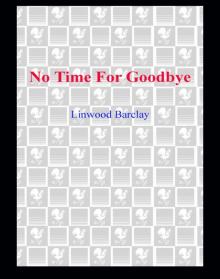 No Time for Goodbye
No Time for Goodbye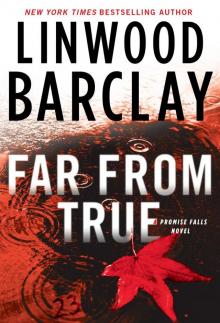 Far From True
Far From True Lone Wolf
Lone Wolf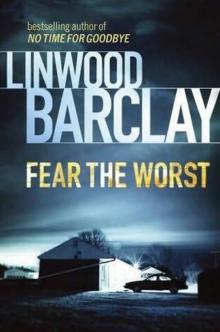 Fear the Worst
Fear the Worst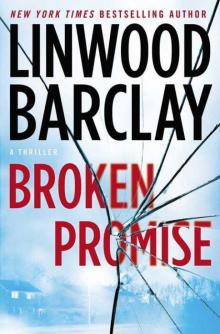 Broken Promise
Broken Promise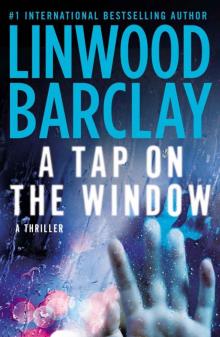 A Tap on the Window
A Tap on the Window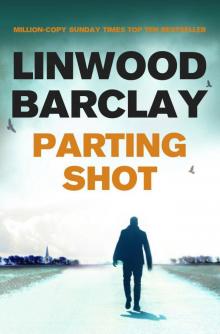 Parting Shot
Parting Shot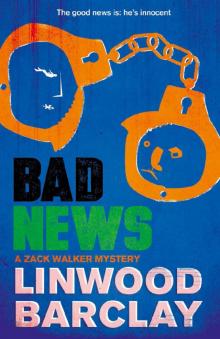 Bad News
Bad News Too Close to Home
Too Close to Home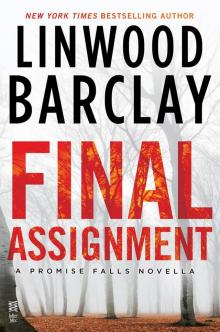 Final Assignment
Final Assignment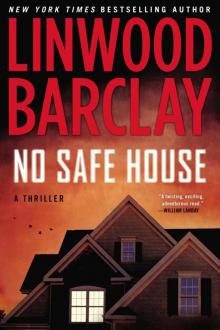 No Safe House
No Safe House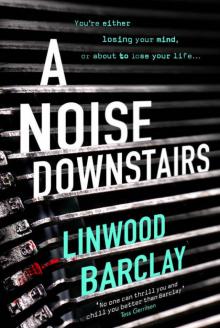 A Noise Downstairs
A Noise Downstairs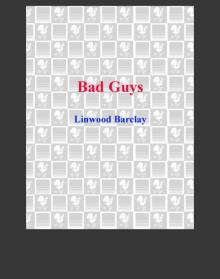 Bad Guys
Bad Guys The Accident
The Accident Stone Rain
Stone Rain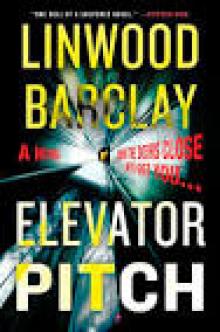 Elevator Pitch
Elevator Pitch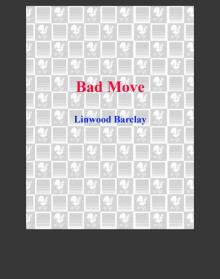 Bad Move
Bad Move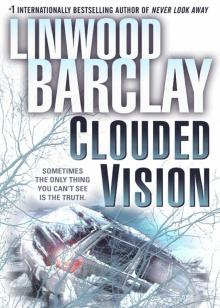 Clouded Vision
Clouded Vision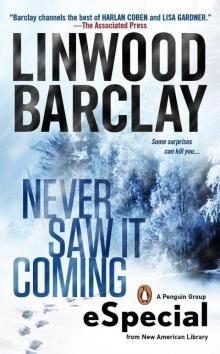 Never Saw It Coming
Never Saw It Coming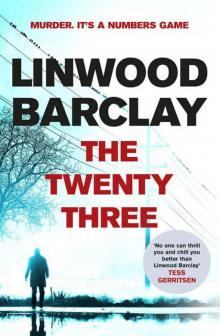 The Twenty-Three
The Twenty-Three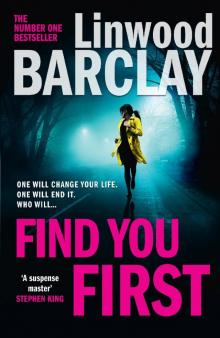 Find You First
Find You First Never Look Away
Never Look Away Elevator Pitch (UK)
Elevator Pitch (UK)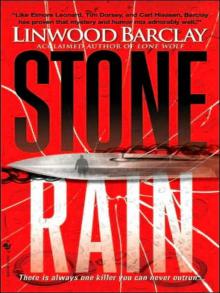 Stone Rain zw-4
Stone Rain zw-4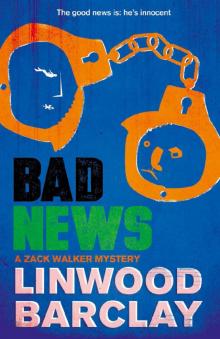 Bad News: A Zack Walker Mystery #4
Bad News: A Zack Walker Mystery #4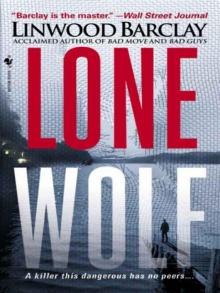 Lone Wolf zw-3
Lone Wolf zw-3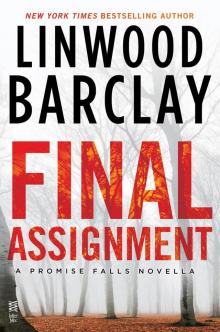 Final Assignment: A Promise Falls Novella
Final Assignment: A Promise Falls Novella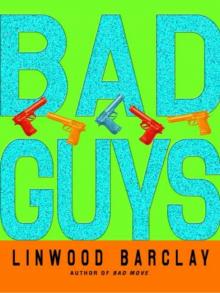 Bad Guys zw-2
Bad Guys zw-2 Never Saw It Coming: (An eSpecial from New American Library)
Never Saw It Coming: (An eSpecial from New American Library) Never Look Away: A Thriller
Never Look Away: A Thriller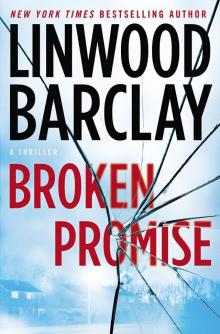 Broken Promise: A Thriller
Broken Promise: A Thriller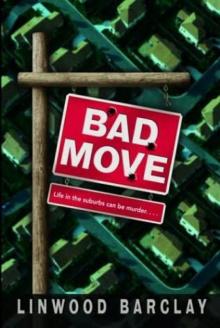 Bad Move zw-1
Bad Move zw-1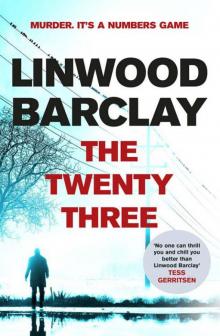 The Twenty-Three 3 (Promise Falls)
The Twenty-Three 3 (Promise Falls)